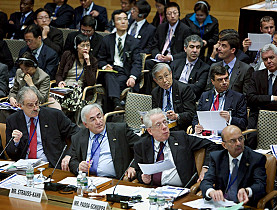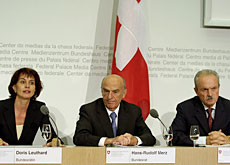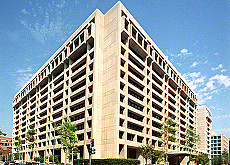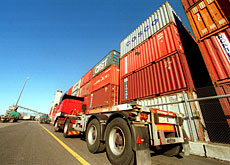IMF advisory body says time for reform has come

The steering committee of the International Monetary Fund (IMF) has endorsed granting emerging economies more voting power.
This would mean a loss of influence for nations like Switzerland, if approved by all of the IMF’s 185 member countries.
The decision was taken at the twice-yearly meeting of the International Monetary and Financial Committee in Washington and has the support of the IMF’s new managing director, Dominique Strauss-Khan.
An essential part of the plan calls for the transfer of a block of voting rights from industrialised countries to developing nations.
Industrialised countries currently control 57.9 per cent of the votes, and this has been seen by poorer nations as a deficit of democracy within the IMF.
If the reform is approved, Switzerland would lose 11 per cent of its votes, said Finance Minister Hans-Rudolf Merz, who represented Switzerland at the weekend meeting.
Switzerland currently has 1.57 per cent of the total, whereas Brazil – one of the countries expected to benefit – has 1.38 per cent.
“This [loss] is not much and is part of a necessary compromise to reach a global agreement for the institution,” Merz told swissinfo. He added that the reform would “reinforce the voice of developing countries without weakening the input of donor nations too much”.
While Brazil and other emerging economies such as China, India and Mexico support the changes in their relative voting power, some nations that stand to lose from the shift – such as Russia, Argentina, Saudi Arabia, Iran and Egypt – oppose the move, saying it does not go far enough.
Staff reductions
Switzerland will be also feel the impact of reform if the body goes ahead with plans to reduce its international staff by about ten per cent from 2011.
It could affect Swiss managers, economists and secretarial staff but also the office of the group of countries that Switzerland represents at the IMF, including Poland, Serbia and Azerbaijan.
Saturday’s meeting was dominated by the financial crisis, with the committee urging the IMF to keep closer tabs on the global economy in the hope future crises like the one currently shaking world markets can be prevented.
The 24-nation steering committee said global financial instability had increased and inflation risks had risen due to a sharp run-up in the cost of food and other commodities.
“The United States still does not have sufficient regulatory standards,” Merz said of the reason for the financial crisis. “Monitoring of US banks is extremely complicated and coordinated [action] is difficult.”
For his part, the president of the Swiss National Bank, Jean-Pierre Roth, pointed out that the “IMF is not authorised to carry out monitoring activities”.
However, a statement released by the committee after the meeting called for action: “Policymakers should continue to respond to the challenge of dealing with the financial crisis and supporting activity, while making sure that inflation is kept under control.”
swissinfo with agencies
Quota subscriptions generate most of the IMF’s financial resources. Each member country of the IMF is assigned a quota, based broadly on its relative size in the world economy.
A member’s quota determines its maximum financial commitment to the IMF and its voting power, and has a bearing on its access to IMF financing.
The US has the largest quota of the 24 members of the Executive Board at 17.08 per cent. Germany and France have close to 6 and 5 per cent respectively, while Switzerland and Poland share a 2.84 per cent quota.
The IMF is an international organization of 185 member countries.
It was established to promote international monetary cooperation, exchange stability, and orderly exchange arrangements; to foster economic growth and high levels of employment; and to provide temporary financial assistance to countries to help ease balance of payments adjustment.

In compliance with the JTI standards
More: SWI swissinfo.ch certified by the Journalism Trust Initiative











You can find an overview of ongoing debates with our journalists here . Please join us!
If you want to start a conversation about a topic raised in this article or want to report factual errors, email us at english@swissinfo.ch.